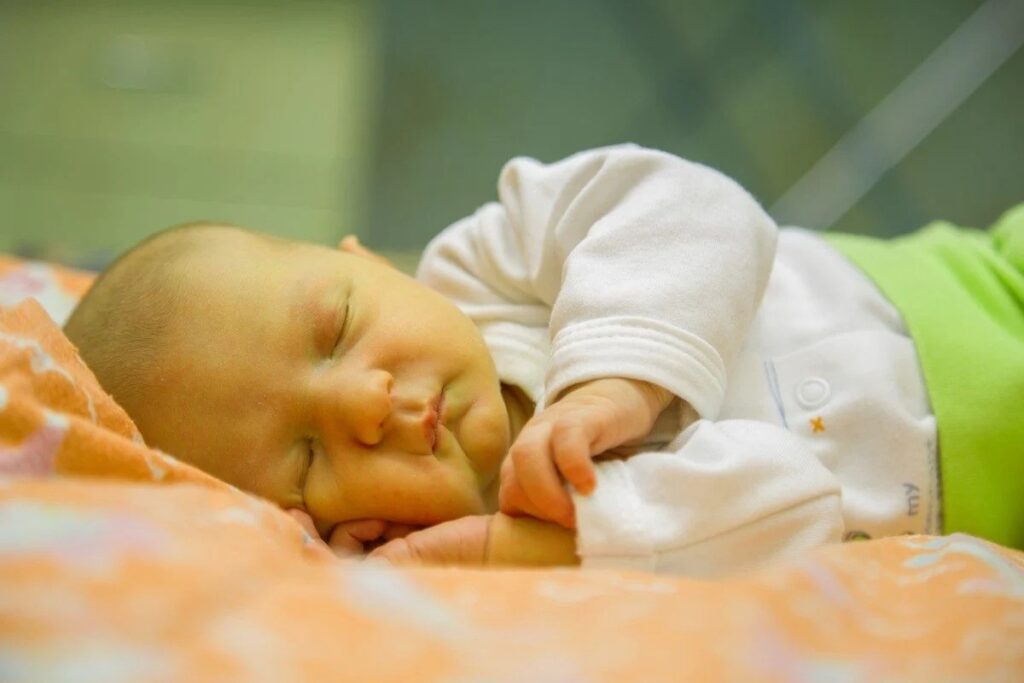E-mail: Babyawbd@gmail.com
E-mail: Babyawbd@gmail.com

When you hear the word jaundice, you think of yellow coloring on the skin. The same thing happens with newborns. Neonatal jaundice is a yellow discoloration of the skin and the whites of the eyes of a newborn baby due to excess bilirubin. There is nothing to worry about. Newborns become fine after a few days.
What you will find on this page:
What is Neonatal Jaundice?
Neonatal jaundice is a yellow discoloration of the skin and the whites of the eyes of a newborn baby due to excess bilirubin (a yellow pigment of red blood cells).
Neonatal jaundice is common in newborns but is more common in premature babies. My baby was also born prematurely and had jaundice, which lasted almost 25 days. My baby became okay without any treatment, so keep patience unless there is something serious in your baby’s condition.
Different types of jaundice in newborns
Physiologic Jaundice
Physiologic jaundice is most common in newborns. When newborns have high bilirubin levels, physiologic jaundice occurs. It appears on the 2nd or 3rd day of life. It starts from the face and spreads to the whole body.
Newborns naturally get rid of physiologic jaundice. It resolves around one to two weeks for full-term newborns and up to 3 weeks for premature babies. This is exactly what happened to my premature baby.
Breastfeeding Jaundice
If your baby doesn’t get enough breast milk, then breastfeeding jaundice happens. It leads to dehydration. Try to give adequate breast milk or formula milk to your baby.
It appears in the first week of birth. It may take a long time to go away. So feed your baby properly and make sure the baby gets enough milk.
Breast Milk Jaundice
Breast milk jaundice occurs due to substances in breast milk. It’s different from breastfeeding jaundice. Your baby’s liver breaks down bilirubin (a yellow pigment of red blood cells) because of the substance in your breast milk. It leads to breast milk jaundice. It appears after one week and can last a few weeks or months.
What causes jaundice in newborns?
Bilirubin (a yellow pigment in red blood cells) causes jaundice in newborns. Due to excess bilirubin levels, neonatal jaundice happens. There are some other reasons why jaundice happens in newborns. These are:
Is jaundice in newborns common?
Yes, neonatal jaundice is common and normally harmless. Up to 60% of newborns experience jaundice, and 80% of premature babies go through jaundice.
Symptoms of jaundice in newborns
Some common symptoms of jaundice
How to treat Neonatal Jaundice?
Neonatal jaundice is common in newborns and often resolves on its own. If the baby has mild jaundice, keep the baby hydrated and feed frequently. After a few days, the baby will be okay. If breastfeeding is insufficient, give formula milk to keep the baby hydrated.
When a baby has jaundice for several days, a blood test is needed to check and monitor the baby’s bilirubin levels.
If a baby has high bilirubin, phototherapy (blue light treatment) is needed. In this treatment, your baby will be undressed and the eyes will be covered to protect them from the blue light.
Phototherapy has some side effects that some babies manage, but your baby may experience itching or rashes.
In the case of severe jaundice, exchange transfusion is a better treatment for newborns. In this treatment, the baby’s blood is gradually removed and replaced with donor blood. This decreases bilirubin levels and removes antibodies causing red blood cell destruction.
When my baby went through neonatal jaundice, I didn’t need any treatment, and it lasted almost 25 days. I fed the baby properly and gave him a sunbath, and my baby became okay.
Remember, every baby is different, so monitor your baby. If anything severe occurs, consult with your doctor.
How is jaundice diagnosed?
Your health provider will check your baby’s skin colour to identify jaundice. He first checks your baby’s physical condition. If it is severe, he will perform a blood test to check bilirubin levels, as high bilirubin levels can be harmful to babies and dangerous for your baby.
The health provider may also perform an ultrasound of the liver to check its condition. Follow exactly what the health provider suggests.
Can jaundice in newborns be prevented?
No, you cannot prevent neonatal jaundice. But you can control jaundice so that it doesn’t become serious. You need to feed your baby frequently, with eight to twelve feedings a day. If breastfeeding is not sufficient, give the baby formula milk. Keep the baby hydrated.
When should you consult with a doctor?
When you notice these signs and symptoms in your baby, consult your doctor immediately.